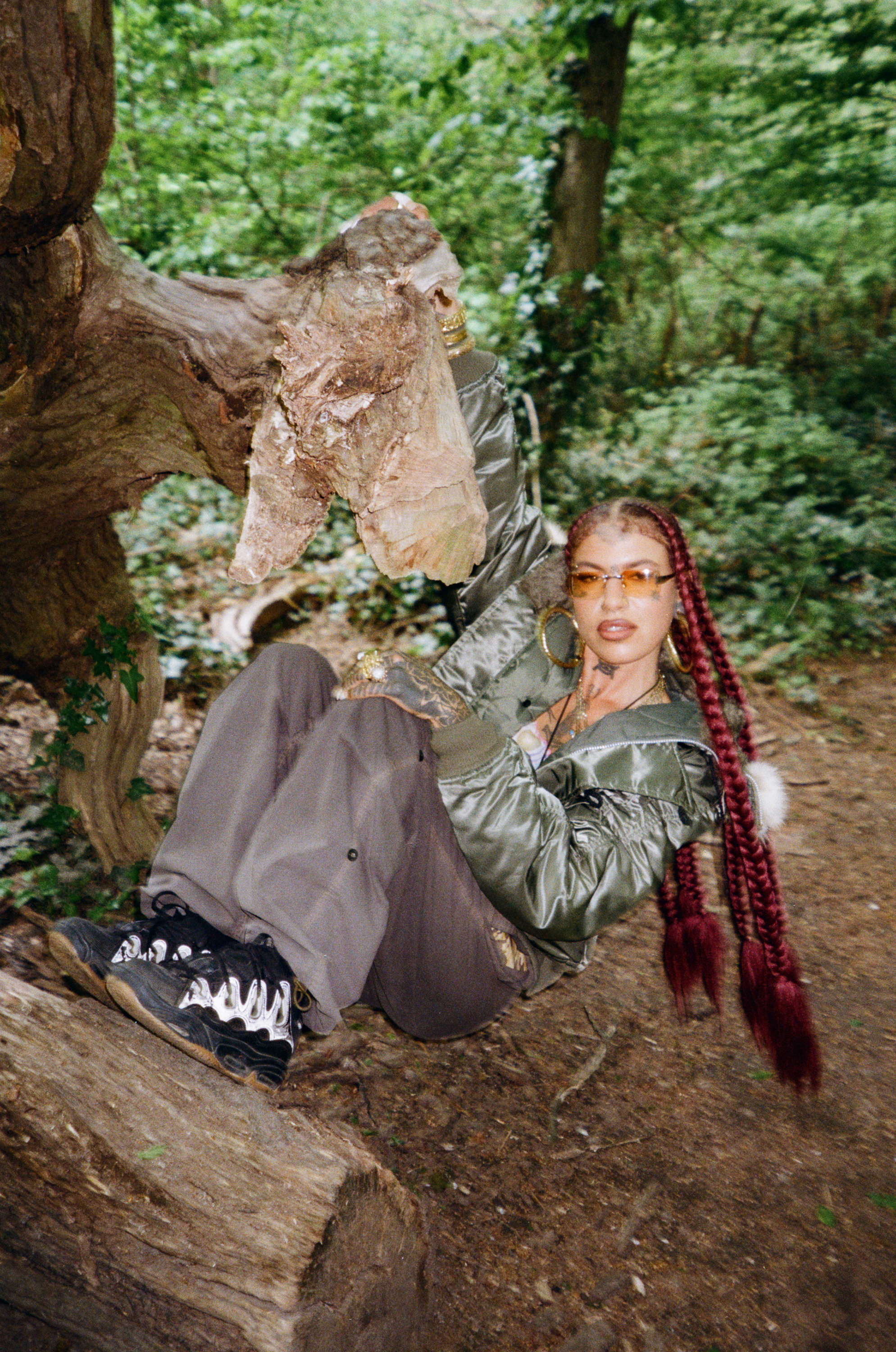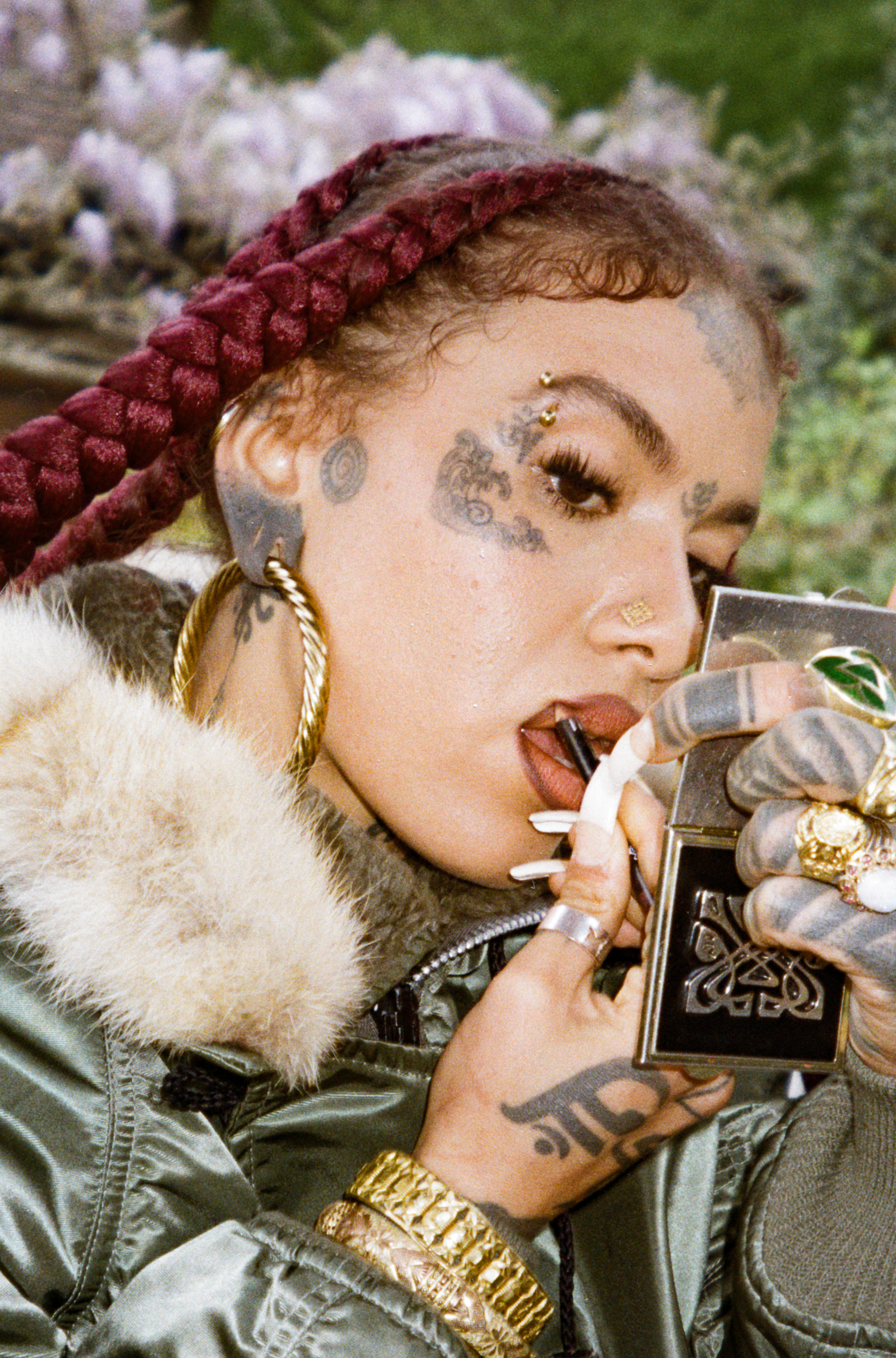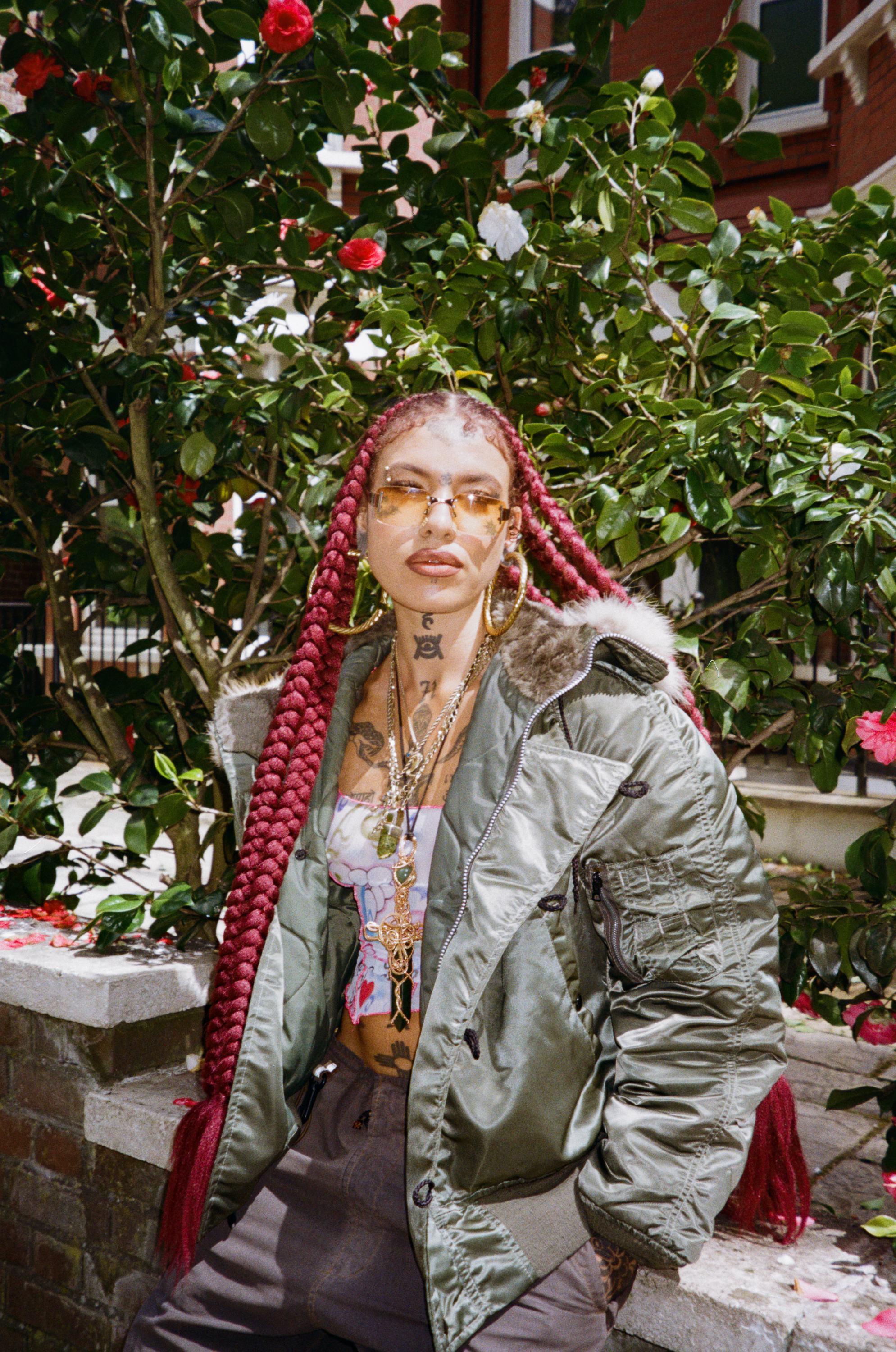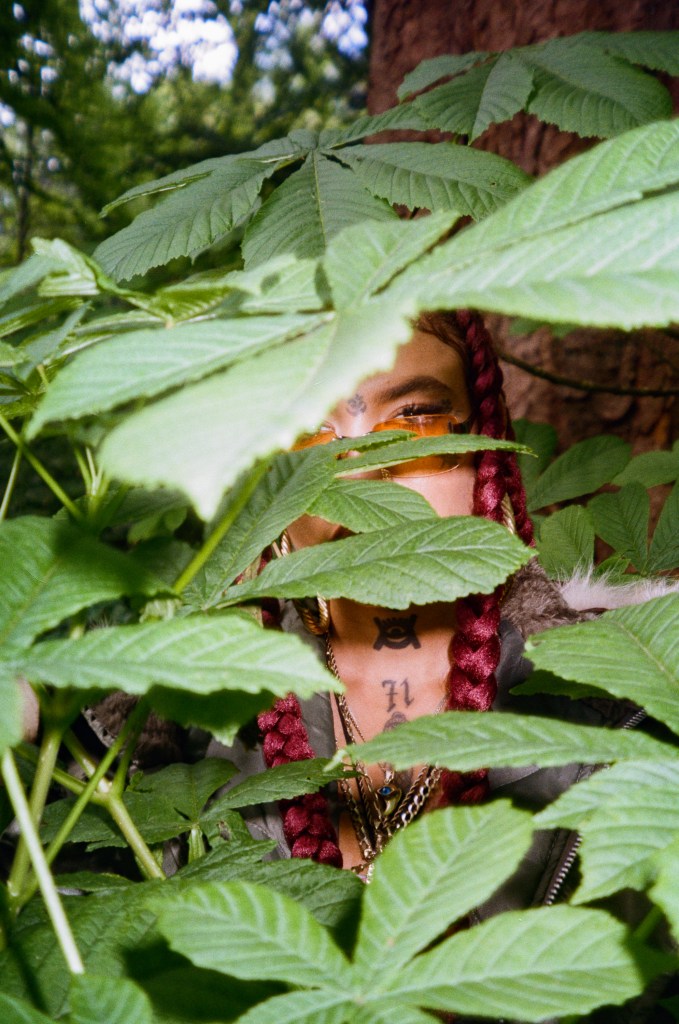“Ahh all I’ve got is weed and no Rizla, man… and no lighter!”
I’m sitting beside Bermondsey-born artist Greentea Peng on a bench in the clearing at the centre of Highgate Wood in North London, preparing to speak about her debut album Man Made. She’s searching the pockets of her khaki green parka, rueing the lack of materials needed to bill it. It’s one of those British mornings where the sun is battling against the clouds, and a spliff would definitely take the chilly edge off. Despite the cold, we agree that it’s nice to meet outside, among nature instead of trapped behind screens.
Videos by VICE
In 2019, Greentea’s performance of “Downers” – a bluesy lament to Xanax-induced numbness and inner city alienation – for music platform COLORS went viral. That breakout moment happened between the release of two meditative, genre-melting EPs. 2018’s Sensi came first, soaking Greentea’s husky vocals in reverb, laying them over warped electronic beats, before 2019’s spiritually-minded Rising added jazz flourishes and hazy RnB to the brew.
Man Made expands Greentea’s sonic universe even further, drawing on everything from hip hop, jazz and neo-soul to drum and bass, dub and ragga across an 18-track musical odyssey. It features production from longtime collaborators Earbuds, SAMO & KIKO and Mala from legendary dubstep duo Digital Mystikz. February single “Nah It Ain’t The Same” sums up the vibe. Think: smoky bop, that transitions into a freeform jazz, ambient jungle fusion, fit for blissed-out sunrise skanking in a festival field.

“When I released Sensi I’d only just picked up a pen and started writing again. I was going through heartbreak. That was at the forefront of my mind, so I wrote about it,” she explains. “But social commentary, that’s not a new thing for me. I’ve always been into the state of things, and I just love people. I’m constantly bunnin’ down Babylon. So it wasn’t so much a shift, it was just that was what I needed to express at the time.
“I had songs written that I didn’t have the energy to back up then. I wasn’t confident. I was questioning myself. Last year certain things started to click, and I was like, I’m not just gonna keep writing songs about love and weed! You know what I mean, bruv?” She lets out a throaty, self-deprecating laugh.
Amid collective and personal turmoil, Greentea decamped to the woods last summer with her band The Seng Seng family to record Man Made over a six-week period. “We got quite high and explored a lot of sounds and vibrations. I was feeling so much at the time.” The record’s range of emotions ebb and flow like the tides. Opener “Make Noise” is the album’s dub manifesto (“for the collective and not the culture,” she intones over its woozy beat); “Free my People” encourages us to free ourselves from “man-made constructs created to divide”; Dismay at “dutty Babylon” turns to defiance on “Maya”, with her powerful voice soaring over electric guitars in the track’s final minute.
But there’s space for happiness too. “Dingaling” interpolates Black Twang’s “So Rotten” and 2Face’s “African Queen” – it has a carefree bounce that feels like a London block on a buzzing summer night. She continues, “It really reflects in the album, the different moods and the different states of mind. It does explore some difficult topics, pain, anger and all of that.”
Greentea doesn’t necessarily want us to take to the streets, Molotov cocktails in-hand. She does want us to start thinking about our place in “this fickle paradise”, as she puts it on April single “Kali V2”, which nods to the Hindu goddess of death and rebirth.
“I always try to bring it back to love and unity,” she says. “I didn’t want to just add fuel to the fire. It’s a very sensitive time. You don’t want to make people feel even more anxious than we already feel, and even more confused. I can’t offer any solutions, but I can offer some authentic expression. And plant little seeds, through sick vibrations. It’s quite subliminal. I wasn’t trying to be like BOOM, like Immortal Technique.”

In its near entirety, the album is tuned a semitone lower than the industry standard, to a frequency of 432 Hz. This is said to be the universe’s original frequency, capable of stimulating the heart chakra and healing the listener’s spirit.
“I wanted to bring people into their heart space a little bit more, into their feelings a little bit more, a little bit more of a deeper vibration. Less heady. More soul. It’s a proper social experiment, and some people might think it’s bullshit. That’s blessed too. I just thought if I’m putting so much intention into this, why not actually go all the way and fucking give it a go? And I swear I could feel it when we were recording. Obviously, we had taken copious amounts of mushrooms and…” She pauses. “Is that a cat running around, or a dog?”
A little grey fur-ball running frenzied circles on the grass has caught Greentea’s attention. She’s truly present and in the moment. At one point we pause while she blows kisses at a smiling greyhound and talk about our own dogs. Later we say hi to a cute toddler with blond ringlets, who’s either admiring Greentea’s chunky red rope-braids, face tats, gold jewellery and overall enchanting aura, or my beanie.

Man Made unfolds like a kaleidoscopic, transportive trip. Mushrooms, and we ain’t talking Porcinis or Portobellos, were an important component of its making. They feature prominently in Morgan Benjamin’s psychedelic cover art, while on the free flowing “Party Hard” interlude Greentea urges us to free our minds and [responsibly] eat some.
“They’ve been a massive part of my transformation, my healing, of reawakening into my true self. I think mushrooms really helped me get into a really natural expressive state. You know, a lot of songs are like freestyles. Which is cool. I’ve never done anything like that before. They gave me a lot of confidence – confidence that was already there, but that I couldn’t locate at the time. It was beautiful, probably the best time of my life to be honest. I really enjoyed it.” Her voice quietly trails off, like she’s remembering those times, or maybe the grief that preceded it.
Greentea’s stepdad Jim passed away in July, just before she went away to record the album. The pulse underpinning the project is one of collective healing. That becomes even more profound when you know how much she was hurting at the time. She dives into the idea of shared pain on mid-album cut “Suffer”. The track’s dreamy, mellow strings and calming vocals transport you to a moonlit Tulum beach.
“My grief is your grief, bruv. We’re grieving together, maybe not over the same things, but like, I’m feeling what you’re feeling. Grief is a necessary part of life. It’s how you come back from the grief and how you transmute the grief. Obviously it’s very personal. But at the same time, the intention is this offer of healing for the collective. It’s for everyone. With everything going on, I was grieving before my dad died. The whole year, I was basically on the verge of losing my mind. You know, I decided to transmute this into art.”
Swindle-produced closer “Jimtastic Blues” directly addresses that grief. The track’s final minute and a half blooms into joyful strings and horns. It feels like a celebration of life, a happy ending to a beautiful story.
“It’s one of the saddest songs I’ve ever written, but it sounds quite fun, the tune. I wanted it to have that nice contrast. Transition is an inevitable and beautiful process. It’s something that ultimately is so natural, the only certain thing we have in life is that we are going to die. We really kept it in the family when he died. We decorated the coffin. And we gathered with him. It was love. The whole album is a tribute, because he definitely inspired it.”
Greentea is looking towards the tree-line and the grey sky beyond it now. A tear rolls down her cheek. “When he died, you start to remember how much someone’s actually influenced you and impacted your life. I think he would have loved the album.”
I apologise, mindful that her grief has surfaced as our conversation is coming to an end. But Greentea is characteristically thoughtful. “It’s okay. I think it’s good to talk about it anyway. I’m bare open. And my music’s very vulnerable, personal and honest so… you know.”
More
From VICE
-

Bill Pugliano/Stringer/Getty Images -

Erickson Memorial Chapel (Credit: Google Maps) -

Skynesher/Getty Images


